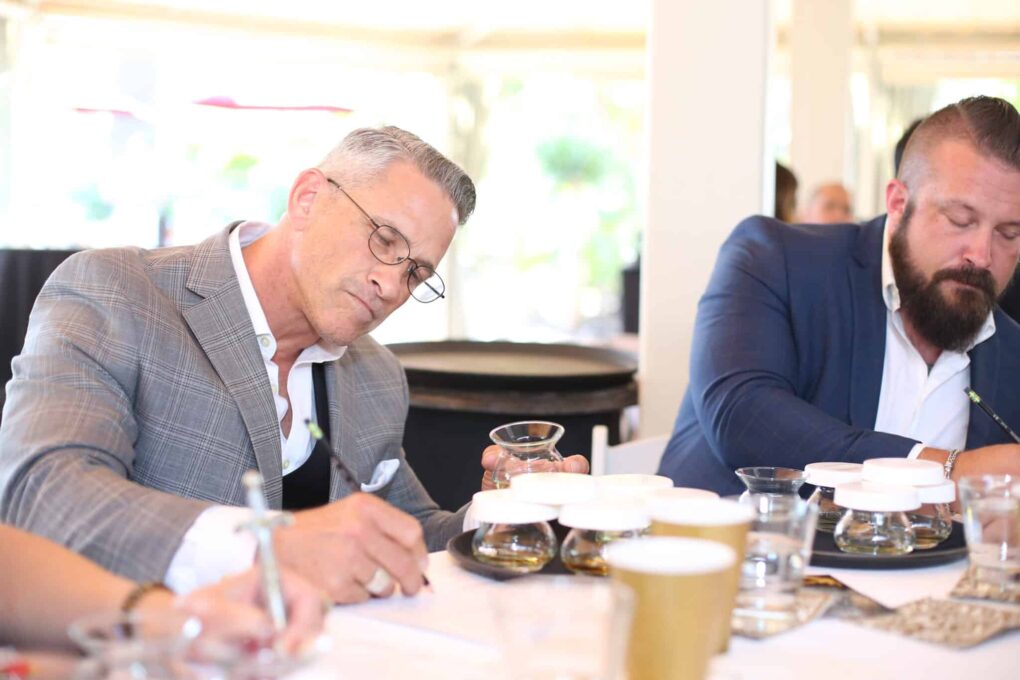Elevating Spirits Competition Judging with Sensory Science
George F Manska, CR&D Arsilica, Inc. |
|
In general, spirits competitions offer distillers a path to brand recognition and many help consumers make informed decisions. However, many place their highest priority on profits, ultimately neglecting critical choices of glassware and methodology to improve sensory aspects of tasting, quality assessment, and scoring reliability. The NEAT glass, designed through rigorous application of physical, chemistry, and sensory science, represents a major shift and development opportunity for competitors who wish to prioritize diagnostic and evaluation accuracy. By minimizing the interference of pungent, anesthetizing ethanol vapors, NEAT reveals the true aroma and flavor profiles of spirits. Competitions adopting the NEAT glass have committed to the evaluation of spirits based on their inherent qualities rather than biased perceptions. Scientific Tool for Aroma Assessment: The NEAT glass was specifically developed to improve sensory analysis. Its unique design, with a neck, flared rim, and large bowl, disperses ethanol vapors to prevent masking delicate character aromas. This scientific approach improves diagnostic accuracy by eliminating ethanol interference to support consistent, unbiased evaluations. By contrast, traditional tulip glasses funnel over 65% ethanol vapors directly into the nose, dulling the olfactory, and masking subtle but crucial aromas. Eliminating Ethanol’s Anesthetic Effect: Ethanol’s most problematic characteristic is its anesthetic ability to numb the senses without awareness, particularly when concentrated through narrow-rimmed tulip glasses. High levels of numbing are known as olfactory fatigue, which severely halts the identification and detectability of aromas in later samples during flights of five or more spirits, creating a critical disadvantage for those entrants who were unfortunately placed near the end of a tasting flight. This often results in lower scores for those spirits—not due to inherent flaws, but because judges’ senses are dulled by ethanol alcohol exposure. NEAT mitigates olfactory fatigue by dispersing ethanol’s anesthetic vapors, preserving sensory acuity throughout the entire judging session, and ensuring that all spirits, regardless of their position in the tasting sequence, are judged fairly, without bias.
Diffusing Ethanol Pungency: The pungency of ethanol distracts the evaluator from focusing on a spirit’s true aromatic profile. Pungency dominates the olfactory experience, concealing more nuanced aromas. By concentrating harsh ethanol vapors, tulips cause discomfort and distort perception. NEAT disperses ethanol vapors away from the nose, reducing this pungency and allowing judges to focus on the authentic aromas of each spirit, resulting in more accurate sensory analysis. Enhancing Flavor Perception by Vessel Shape: NEAT’s large-diameter bowl and low-profile design offer substantial improvement to the sensory experience. The shape allows for more effective swirling, releasing volatile compounds and enhancing flavor perception. Unlike tall tulip glasses, which are difficult to swirl, NEAT’s large bowl design releases more complex aromas through swirling. Moreover, NEAT’s shorter profile brings the nose closer to the aromas, capturing the full range of compounds lifted by vapor pressure and highly volatile ethanol. Once the ethanol is dispersed by controlled diffusion, judges can assess flavor complexity, mouthfeel, and a comprehensive profile of character. Short and fat deliver aroma, and tall and skinny deliver volatile, anesthetic, pungent ethanol.
Isolating Aromas at the Judging Table: NEAT pioneered the use of sanitary paper caps to cover samples in competitions, preventing aromas from dissipating and confusing the evaluation process. Before NEAT introduction at the San Francisco Wine and Spirits Competition in 2013, sample glasses were left uncovered, leading to cross-contamination of aromas in the judging environment. Sample covers now improve most competitions, underscoring the importance of isolating samples for accurate evaluation. Ensuring Consistency, Fairness and Building Competition Credibility: Consistency is essential in spirits judging, and tulips concentrate ethanol, leading to inconsistent scoring. NEAT allows judges to maintain clarity and consistency throughout the flight, ensuring each spirit is judged on true merits rather than the limitations of tulip glassware; and promotes fairness and accuracy. Over 40 major international spirits competitions annually choose NEAT as their official judging and evaluation glass demonstrating commitment to sensory accuracy and fairness, and ensuring scores are based on true flavor/quality. Supported by Sensory Science: By understanding how human senses interact with ethanol molecules, NEAT researchers optimized the evaluation process by eliminating anesthesia and distracting pungency while enhancing the detection of complex aromas and flavors and delivering reliable results. See peer-reviewed, open-access, research journal paper Technical Report—Applying Physics and Sensory Sciences to Spirits Nosing Vessel Design to Improve Evaluation Diagnostics and Drinking Enjoyment (mdpi.com). Independent research comparison confirms the effect of dissipating ethanol and using wider and shorter glasses as a preferred evaluation tool. Glass-Vessel-Aroma-DA-Study-Sept-2019.pdf (sensationresearch.com) Conclusion: Spirits competitions often focus on profit rather than accuracy in evaluation. The NEAT glass offers a scientifically reliable solution for those seeking to elevate their judging standards by ensuring every spirit in the competition is evaluated and judged on its true merits. Competitions that adopt NEAT commit to fairness, accuracy, and integrity. Not only is NEAT preferred by professional judges and competitions who aim for the highest level of sensory precision, but it’s also an invaluable tool for spirits enthusiasts. NEAT enhances enjoyment and understanding as an indispensable vessel to those serious about accurate spirits evaluation and striving for informed purchasing decisions. Bio: George F Manska, CR&D, Arsilica, Inc. Qualifications: Published sensory science researcher, and entrepreneur. BSME, NEAT glass co-inventor Mission: Replace myth and misinformation with scientific truth through consumer education. Note: Enrolled NEATNEWS subscribers are entitled to a 10% discount on all purchases and free shipping over $55 for as long as you are enrolled. Coupon code: ILUVNEAT |



